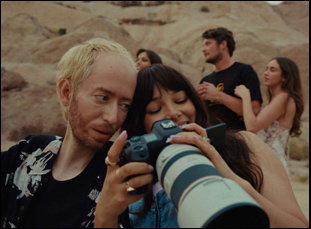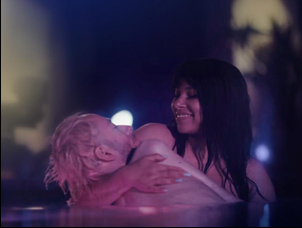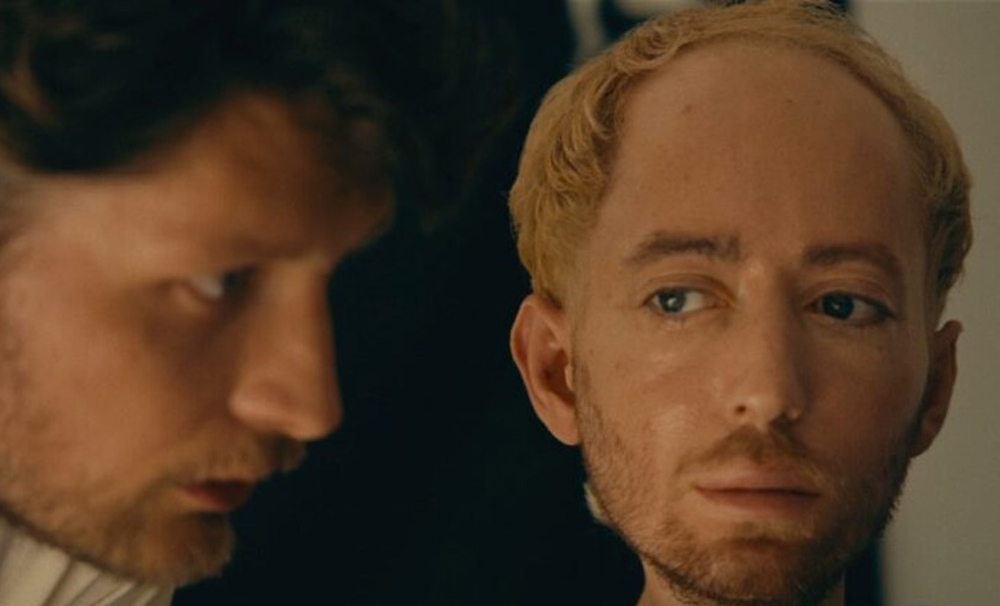Danny (Danny Kurtzman) couldn’t find himself in a more uncomfortable position than where he is at the start of “Good Bad Things,” curled up in bed scrolling through his iPhone and looking at old photos and videos of his ex-girlfriend Bianca (Katie Lee). It seems on the occasion of his latest birthday that nothing is going his way, with an even less uncertain professional future than a romantic one when his marketing company is relying on a successful pitch for a dating app called Rubi and even with his boundlessly enthusiastic business partner and roommate Jason (Brett Dier) and father (Gale Hansen) around for support, he can’t help but feel like the world is coming down around him. Then again, Danny has overcome difficult circumstances before as someone experiencing muscular dystrophy and the feature debut of both the film’s director Shane D. Stanger and its star Kurtzman shows considerable confidence in telling the story of someone in search of regaining his.
While Danny is loathe to put himself out there after his recent breakup, the necessity of trying out the Rubi app for the account he hopes to land requires him to set up a profile and to his surprise, he gets a few bites including Madi (Jessica Parker Kennedy), a free-spirited photographer for whom life is an adventure. Danny could use a bit of that, though it can be confusing that while Madi earns a living largely from taking wedding pictures, she doesn’t yearn to have one of her own, joining the dating app for more casual hookups than serious relationships, which proves to be a problem when the two share a real spark.
It is telling that the foundation of Danny and Madi’s relationship — and perhaps its undoing — is tied to their professional calling when the film itself surely benefits from a detour Stanger made in his own career, initially following all the traditional steps to make a living behind the camera before stepping away to launch a successful dessert shop business. In “Good Bad Things,” career aspirations may not always align with personal desires, but “Good Bad Things” is unusually accomplished for a first feature, and there’s a sense that after learning how to run a tight ship behind the scenes in their respective fields, Stanger and Kurtzman, who also was a self-made entrepreneur with a fashion business, knew how to make a production work for them while drawing on a trust built over two decades of friendship to have it feel as if they’re really cutting loose on screen, giving the film a real and distinctive casual charm.
At the premiere of “Good Bad Things” earlier this year at the Slamdance Film Festival, audiences and the Grand Jury agreed, giving the film its two top prizes and now it is headed to AMC Theaters across the country and while I got to witness Stanger balancing life and work with grace firsthand as he cradled a newborn in his arms during his promotional duties for the film, he spoke about how he and Kurtzman could take something personal and bring it to the screen without losing anything in translation, how an unorthodox route to the director’s chair paid off and having one of the best scenes of the film even take him by surprise.

Yeah, it was always the plan. I didn’t really know how long it would take and it was up in the air because I started my ice cream company The Baked Bear right around 25 turning 26, so it had been my first few years out of college. I was trying to get into filmmaking and I worked in an agency and then did a little producing, but I felt it just wasn’t a viable career path for me at the time. I wasn’t really making enough money to survive out here and I ended up getting an opportunity to open a restaurant with my best friend, but it ended up becoming the catalyst to come do this again. In my head, I [thought], “Oh, maybe I’ll be back in a few years,” but eight years went by and thankfully it did because i got a chance to come back and go to school and and learn how to care, which I think is a hard thing in your twenties to understand what it takes to really go for something and give it everything you’ve got. But I got a chance you know get some life perspective and a lot of experience working with all sorts of different people all over the country and by the time I came back, I was like “Oh, this is what I’ve been doing for the last 10 years. It’s just a little bit of a different. A lot of it’s just organization and keeping people on track.” All the business skill sets really lent themselves to directing so thankfully it felt really natural.
How did you end up teaming with Danny?
Danny’s my other best friend from high school and during COVID, I stepped back from my company. We’d been running for eight years and we were growing, but [during the pandemic] stores were shutting down like dominoes for a little bit while everyone was trying to learn how to work through what was going on. It was a really stressful time, but what happened is I got comfortable being a little bit more away from the everyday operation just because we all had to and along the way some people really stepped up and I took the opportunity to to reevaluate my life a little bit. I wanted to be making films and I didn’t feel like I could wait any longer. My business partner Rob stepped up and basically took over all of my day-to-day stuff and I’m a board member, but I stepped back from that to go to film school at USC.
At school, my first short film that I made was with Danny because when you’re making a short film, especially in film school, there’s this feeling of that you want the thing you do to matter and I was especially wanting that because I’d been waiting for eight years to be in this position. I couldn’t find something I cared about and I was talking to Danny and [I said,] what if you were in the movie?I can get behind the idea of working with you and I’ve never really seen someone with muscular dystrophy on screen [in a central role].” Now we have because Steve Way was on “Ramy” and we ended up making friends with him, but before that, I just felt like Danny was a really unique person and he’s such a good friend of mine. We have so many stories and experiences that I feel aren’t necessarily common, especially for people that don’t have a friend that has a disability and getting a chance to figure out something to do with that and puts him on camera, because that’s something he wanted as well, would be meaningful to me.
So we did the short film and I couldn’t tell if the people in my class liked the film, but they liked Danny. He had an immediate presence that I think just pulled people in, so when I saw how they reacted to him, I thought, “Okay, this is interesting“ because on anyone’s first movie you’re not really going to get actors that are necessarily going to bring all the eyes. You have work your way up to something like that and we ended up getting Brett Diet and Jessica Parker Kennedy once Danny was in because I think their interest was also getting a chance to work with him. But he and I started brainstorming [about a story] in probably the most indie way ever. We barely had a script when we started to put the film together and hiring everybody and we had all these like big plans.
We ended up hiring someone to write a script, but it didn’t work and we were a month out from shooting without a screenplay, so [Danny and I] decided to write our first screenplay together. I just showed up at his house and we spent the next week or two just non-stop writing, putting together something that was presentable and intriguing enough to not cancel the movie. [laughs] From then on, it was writing every weekend and when shooting started, we were always constantly coming up with new ideas and rewriting scenes, so it got to a point where by the time we finished shooting, I wouldn’t say it was the same script but it was the same bones.

It started off somewhat formulaic. In the beginning, we really just wanted something traditionally structured and our first idea was crazy. It was going to be a raunchy “R” comedy, which i’m really happy we didn’t do because i think this just feels way more authentic and something I’m passionate about. We just decided we don’t have a lot of time, so let’s focus on what we know which is our own friendship and how do we tie our experiences into a story that we think is going to be meaningful. Then we had some rules [such as] we can’t ignore the fact that Danny’s disabled, but we were also not going to make that our plot point —that’s [only one] of his many attributes. Sometimes you pick him up sometimes to do this or that [activity], but it’s not thought about. We just know that’s what you do when you hang with Danny, just like there are [various] considerations you have when you hang with friends.
Breaking down those kinds of things, we knew we wanted the audience to get to know him and see him as Danny, and in the first 15 minutes of the film, we really wanted to put them in his world in a way that moving forward the audiences were just on that ride with him. Then we just thought about the things that we’ve experienced. We both are entrepreneurs, so it made sense that these guys in [the film are] entrepreneurs and Jason is an amalgamation of lots of different friends of ours. We thought that there was a really strong contrast between the idea of Danny, who really wants to do things alone but wants nothing more than to settle down and fall in love, and then Jason, who’s alone but doesn’t want any of that, as this contrast of two friends who end up living together because in a way they actually they are each other’s person. That storyline felt like it was the core of the film regardless of what other directions it went on.
There’s one particularly great scene where Jason and Danny are at the piano breaking the jingle for the Rubi dating app that they want to pitch – it really does seem like Brett Dier and Danny fooling around in the best way possible, but it evolves into a serious through line for the film. How did that come about?
It’s funny. That scene was not supposed to be on a piano. It was just supposed to be them at the office riffing ideas —like all the things that they say in the song was supposed to be part of the scene, but then half of that stuff was just was just Brett making it up. What happened was we were changing the room around because we had just finished one scene and moving on to that one, so while the lights and everything were being set and our crew was working, Brett was just playing the piano because there was a random piano in the room. Everyone started gathering around him, just laughing and we’re like, “Wait, this is this is too good.”
I didn’t know Brett was this talented musician, and I can’t remember exactly how it evolved into that [proper scene] so quickly, but [it came from] seeing everyone so excited and laughing about how funny he was on the piano because we were all just getting to know each other. Brett’s so hilarious, but he hadn’t really done a bunch of those more humorous scenes yet, and a lot of times at the end of the emotional scenes, he does all these kinds of things [where] could cap it off with some humor. So Brett’s playing piano and [when] I heard it, I was talking to Danny [and asked], “Should we just switch the scene to the piano?” Danny said, “Yeah,” and we ended up just letting them go. Brett would just riff and some people on the crew were like, “What’s going on? Why is this taking so long?” But watching them, I [thought] “This is going to end up perfect. We just need to let them mess around a little bit more.”
I was sitting right behind them [as it was being filmed], like texting Danny so he would do his little thing in the middle [that adhered to the plot point], but I don’t know that I couldn’t have been happier with that. And that seems like the summary of the movie in a way.
When this starts out as such a personal project with you and Danny and it grows to become this larger production, was it interesting to see it take on a life of its own or have a more objective set of eyes on it?
Yeah, it was a cool experience. We really had a tiny crew —a few producers from my school program because I shot this in the summer between my [next to] last year of film school, so Sean Crampton, another producer that I’ve been friends with since college, came on and we didn’t have a camera team. Our cinematographer Nathan [Haugaard] was our G & E crew, lighting everything himself and operating/pulling focus. He had just come off of “Avatar 2” as one of the head camera operators, so he had just come off the biggest movie ever and now probably to one of the smallest, but he’s so talented and he was all about it. We built a little family and had this idea that we were going to go in and enjoy the process and not put too much pressure on ourselves.
Danny was the center of it all and he’d never been on a movie set, so I think in the beginning everyone was learning to interact with him because he messes around with people. In the beginning, a lot of people may have thought they were offending him or thought he was angry, but he was just joking and with muscular dystrophy, it affects the the muscles in your face so he’s not going to be smiling all the time. Danny’s also not used to being around so many people who are just focused laser focused on him — I mean, no one is. Being the lead of a movie is kind of crazy, but after a few days, I actually had to [say to] Danny, “Hey, we need to talk because I think everyone thinks you’re mad at them, even though I know you’re just fucking with them because everyone’s so nervous [about] offending you.” Sometimes people see you in a wheelchair and there’s this urge of wanting that person to feel okay or accepted, but Danny [would just be like] “I feel fine” and it was so cool because he went from having never been on a movie set to leading this film. Everyone really believed in him and he learned the process and by the second or third week, he was a total pro.
I really was impressed by him because we had no idea how this would turn out, but thankfully for all of us, we built off a foundation of 25 years of friendship to have a really great working relationship [on the set].
When this has all that history behind it and you’ve got a pretty big release for a scrappy independent film like this, what’s it like to be sending it out into the world?
It’s really exciting. I have this little baby, and I have a three-year-old, so I actually haven’t even really had the time to sit back and think about how cool this is, but it feels very fulfilling, especially after so many years of wanting to be doing this and not having done it. To come back and know what I know and change my whole life to pursue this dream, but [believing] it’s very unlikely it’s going to work to then have it actually work feels really fortunate. I feel lucky that this is going this direction and I don’t take it for granted because if anything, I wasn’t expecting it at all.
“Good Bad Things” is now in theaters. You can click here for a theater near you.




